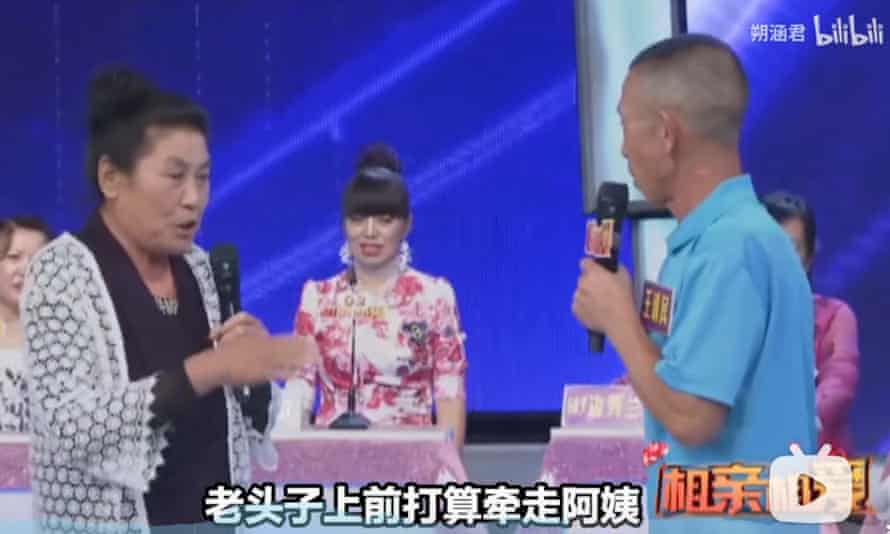Standing before the studio audience the slim older man holds a microphone in front of his blue polo shirt, buttoned to the neck. Wang Qingming seems a little nervous as he faces his prospective date, a formidable looking woman with long black hair piled in a loose bun, her name tag obscured.
“What bad habits do you have?” he asks.
“I’m hungry,” she replies to laughter. “But no mahjong, no smoking, no drinking.”
Asked about her health the woman says her physical condition is good, “but I can’t get pregnant now”, again prompting laughs. He boasts he hasn’t taken medication in a year, she proudly retorts that for her it’s been two. For her turn, she grills him about chores and finances, securing the offer of an allowance, and eventually the two hold hands as they walk to the back of the stage.
The scene is one of countless clips taken from China’s prolific TV dating shows, shared hundreds of thousands of times across social media and written about across the local press. But rather than the usual young and idealistic contestants looking for some sort of romance, those going viral are all in their 50s, 60s and 70s and know exactly what they’re after.
The “aunts and uncles” are direct, frank, and authentic, challenging romantic idealism as well as social taboos about older people and sex. They prioritise practical matters like housing, wages, social security, pensions, bride dowries and health.
There are more than 260 million people aged over 65 in China – about 18% of the population – and about 25% of them are single, widowed or divorced. The older age group is growing, as China struggles to fend off the demographic crisis of an ageing population brought about by decades of government control on family building.

Dr Pan Wang, Senior Lecturer in Chinese/Asian studies at the University of New South Wales, said negative attitudes toward elderly people were omnipresent, often seeing them as inactive, limited in mobility, dependent and frail, underrepresented or excluded from media entirely.
“The shows give elder people agency and provide them a voice to portray their own narratives and an opportunity to look for love and remarriage,” Wang said.
Challenging prejudice, debunking stereotypes
A recurring theme in the clips are headstrong women. In one episode of The Choice of Love a group of women ruthlessly cut into the ego of a man in his 70s looking only for a young and beautiful girlfriend. Some women push back on suggestions they should take on a traditional caretaker role again, while others prioritise financial security, which Wang said reflected concern over the rising costs of living and the struggling social welfare system.
“Aunts basically have no house, no labour insurance and no pension,” said one commenter on Weibo. “Therefore, the needs are similar: money, housing and betrothal gifts. But for men, it’s all about looking at the appearance of the woman first, and then negotiating the conditions … to cook at home, do the laundry, and do housework.”
The shows are also normalising the discussion of intimacy among older generations for a young audience which, according to a 2018 survey, overwhelmingly and mistakenly believes their own parents don’t have sex. Shared clips show older women joking about their sexual abilities or the bragging of men, or elderly men frankly discussing the importance of finding a sexual partner.
“To an extent, these shows debunk the stereotypes and prejudice around the older population, they show that they are active, socially engaging and romantic despite many were born and grew up in the Maoist era, when romantic love was rare and discouraged and dating hardly existed,” said Wang.
“It’s also evident from the shows that some women in their 60s or above are actively engaged in this gender economy just as the young girls do – i.e. wearing heavy makeup, modern clothing and performing their sexual attractiveness on stage, they are no longer seen as just house wives who are supposed to stay in the domestic realm, doing household chores or taking care of their husbands.”
The decisiveness among the older contestants has won young fans and got them thinking about their own relationship goals.
“I think there is nothing wrong with it. Even young people may choose a more open way of getting along … the essence of human-to-human interaction is value exchange” said one.
“Talk openly and honestly, get along with each other in a down-to-earth way, and you can go as far as you can. May all lovers in the world be together.”


